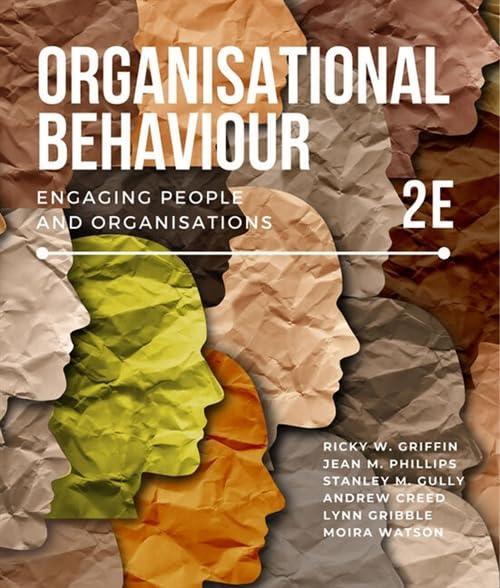With more and more workers participating in the gig economy and many individuals employed as casuals or
Question:
With more and more workers participating in the gig economy and many individuals employed as casuals or under temporary contracts rather than as full-time employees, it is becoming more difficult to engage with employees. An engaged employee is more likely to demonstrate high levels of commitment and loyalty to their employer. They also exhibit other organisational citizenship behaviours (OCB) including organisational trust, job satisfaction and altruism towards other employees, and are less likely to engage in counterproductive work behaviours. However, while casual, contracted and gig workers experience flexibility as to where they want to work and the types of jobs they choose, they are less likely to be loyal or committed to one particular organisation and more likely to be loyal or committed to themselves in their pursuit of work. These types of workers are also more likely to encounter workplace fairness issues around complying with the minimum entitlements that they are owed. One such example is wage theft.111 Examples of wage theft include unpaid wages, superannuation, overtime, penalties, allowances, leave provisions and loadings, including paying employees at a lower rate per hour due to how the role is classified (e.g. as a traineeship rather than a casual employee). In 2019, it was revealed that a number of Australian businesses including the Australian Broadcasting Corporation (2500 casual staff over the past six years), Qantas (55 staff over several years, an average of \($8000\) per employee), Super Retail Group (owner of Rebel Sport, Supercheap Auto and BCF; 3000 employees over the past six years, around \($32\) million in total), Commonwealth Bank (8000 employees over the past 10 years, around \($15\) million in total), Michael Hill (over six years, a total of \($25\) million in total), George Calombaris’ former business MAdE Establishment (524 employees over the past seven years, \($7.8\) million in total), Sunglass Hut (620 staff, \($2.3\) million in total), Coles (store managers over six years, \($20\) million in total including interest) and Woolworths (5700 employees over the past nine years, \($300\) million in total) had underpaid their workers. Many other businesses, including Bunnings, 7-Eleven, Subway and Coffee Club, have also been ‘named and shamed’ for similar misdeeds. While employers are on notice, it appears things have not improved and in 2022 many Australian universities and Subway continued to be named. New Zealand has been following this up since 2016 and appears to have made good progress in ensuring systems aren’t scapegoated; after all, people put information into these systems, and someone made a decision on that input. Underpayment of workers can result in feelings of inequality and unfairness in the workplace which in turn affects employee commitment. Casual, contracted, temporary and gig workers are especially vulnerable to this type of workplace fairness issue as they are usually only with the firm intermittently or for short periods of time. As a result of the aforementioned lower levels of organisational engagement and commitment experienced by these workers, casual, contracted, temporary and gig workers often are not aware of the minimum entitlements that are owed to them, which includes important information about hourly rates of pay, superannuation and penalties. In Victoria, from 1 July 2021, it became a crime to withhold or ‘deliberately and dishonestly withhold wages and other worker entitlements’. So too in NSW, where the Crimes Amendment (Wage Theft) Bill 2021 also makes it clear that wage theft is unacceptable. This is all part of a process ‘to criminalise the worst cases of wage theft’ and ‘stamp out deliberate and systematic wage theft by Australian employers’. The legislation will also aim to ‘name and shame’ employers who underpay their workers by having offenders publicly display a notice that they have underpaid employees.
Questions:
Mainstream
1. What are the pros and cons of being a casual, contracted, temporary or gig worker?
2. From the information contained in the case study, why do you think so many organisations have underpaid their workers? Why does wage theft largely affect casual, contracted, temporary or gig workers?
Critical
1. Moving forward, how would you advise organisations to avoid wage theft and underpayment from reoccurring?
2. How can an organisation improve engagement and levels of commitment with its casual, contracted, temporary or gig workers?
Step by Step Answer:

Organisational Behaviour Engaging People And Organisations
ISBN: 272389
2nd Edition
Authors: Ricky W. Griffin, Jean M. Phillips, Stanley M. Gully, Andrew Creed, Lynn Gribble, Moira Watson





